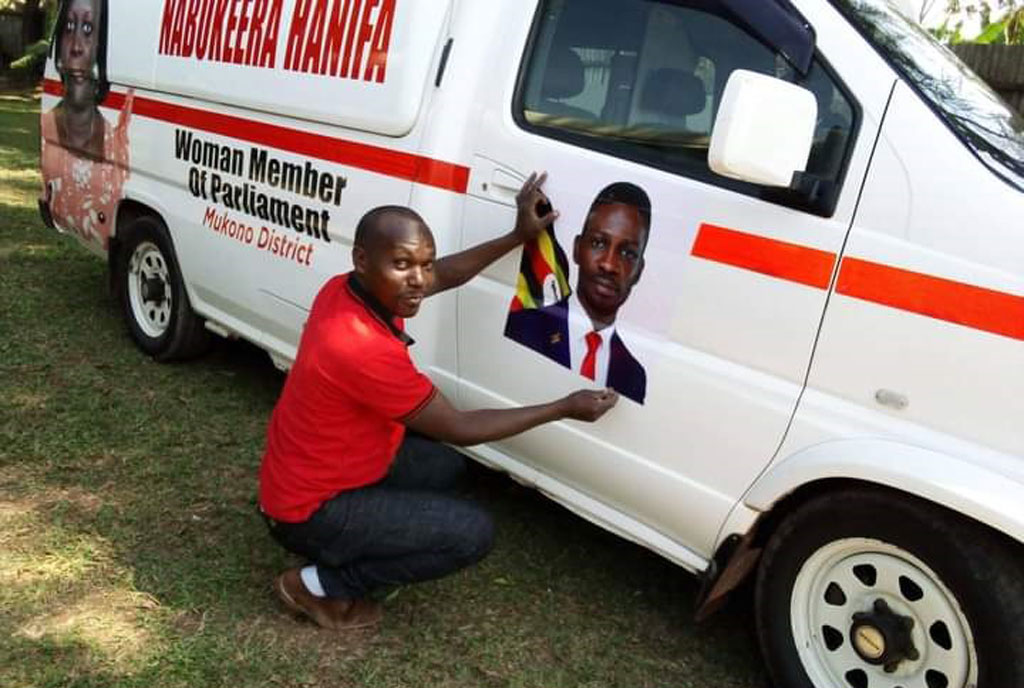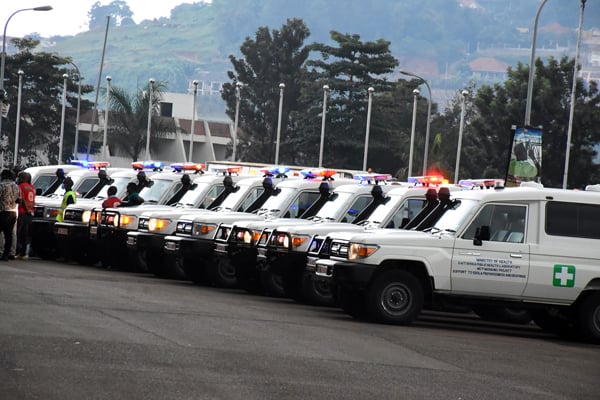Prime
Why MPs’ ambulances charge high fuel fees

Mr Fred Kiyimba, the driver of an ambulance donated by Mukono District Woman Member of Parliament Hanifa Nabukeera.
What you need to know:
- Some MPs have been accused of profiteering from the ambulances they ‘donated’.
- Fee. Residents say they are charged between Shs200,000 and Shs500,000 to transport patients.
When legislators started procuring ambulances, the general impression was that this was one way of giving back to their constituents.
Many of the Members of Parliament (MPs) said the primary target was to help vulnerable patients, especially pregnant women reach health facilities on time.
However, as time went by, patients in some constituencies were asked to start paying some money to meet fuel expenses. The MPs would then pay drivers and service the vehicles.
A section of the residents in the districts of Mukono and Buikwe are now complaining of exorbitant fuel fees charged by drivers of the ambulances, which has forced patients to shun them.
Mr John Baptist Mwebesa, a resident of Nakifuma-Nagalama Town Council, alleges that the driver of the ambulance which was donated by Ms Hanifa Nabukeera, the Mukono District Woman MP, asked him to pay Shs350,000 to have his patient transferred from St Francis Nagalama Hospital to Kiruddu Hospital in Kampala.
“Even if the fuel prices are high, he [driver] couldn’t have asked for such an amount. We thought those ambulances are there to help us, not for making profits,” Mr Mwebesa says.
Mr Abbas Tamale, another resident of Njerere Village, Mukono Municipality, claims an ambulance driver charged him Shs500,000 to transport his sick mother from Njerere to Jinja Regional Referral Hospital.
“We thought these ambulances came to save us from the pain of transporting our patients in commuter taxis and boda bodas, but we’ve come to realise that some MPs consider it as a business,” Mr Tamale says.
“When we saw the portrait of Mr Robert Kyagulanyi [leader of National Unity Platform (NUP)] on the ambulance, we actually thought it was free of charge not until we were told to pay a small fee to meet fuel costs, which we agreed, but currently they are charging us more money in the guise of doing charity,” Mr Benard Kamuntu ,a resident of Nakanyonyi Village, says.
Mr Ivan Wasswa, a resident of Kyungu Village in Mukono Municipality, says although the MPs meet other expenses such as routine servicing of the ambulances, their services shouldn’t be that expensive.
“I can tell you the exorbitant charges have started scaring away residents who really need the emergency services, and if nothing is done, the good intention of bringing the ambulance will die,” he notes.
In an interview on Tuesday, Mr Fred Kiyimba, a driver of the ambulance donated by Ms Nabukeera, denied the allegations levelled against him, saying they are peddled by her boss’s political opponents.
He says ambulance drivers work under harsh conditions and sometimes spend from their pockets to save lives.
“One time I actually wanted to quit my job because many of the people we serve are ungrateful. But my boss counselled me and that is why I no longer listen to detractors,” Mr Kiyimba explains.
Another ambulance driver, who preferred anonymity, says the fees increased early this year when fuel prices rose.
“We had no option, but to slightly increase the fees to cover the rising cost of fuel. When fuel prices normalise, we will definitely revert to the normal fees we were previously charging,” he says.
The Mukono Central Division Speaker, Mr Allan Mawanda, says some legislators hardly repair the ambulances, which prompts the drivers to increase fees to cover for maintenance.
“Those ambulance drivers will not reveal to you that their bosses do not facilitate them, it is a fact that most of those ambulances are serviced by the drivers themselves,” he said.
Mr Jimmy Lwanga, the MP for Njeru Municipality in Buikwe District, says he offered to buy fuel for ambulances within his constituency.
“I decided to meet all the expenses and the only time we charge people a reasonable fee is when the referral is outside the municipality. In such scenarios, residents pay for fuel, but even when they fail to meet the cost of fuel, we still make a top-up,” Mr Lwanga explains.
Mr Johnson Muyanja Ssenyonga says despite losing the parliamentary seat for Mukono South Constituency, he has maintained the ambulance services such as repair costs and paying the salary for the driver and residents only pay for fuel.
“Our people have a lot of challenges in daily lives, many can’t afford the cost of fuel and often times I come in and provide it,” he says.
The Mukono Municipality MP, Ms Betty Bakireke Nambooze, says her ambulances charge a fair fee of between Shs50,000 to Shs70,000 to meet fuel expenses for patients referred to Mulago National Referral Hospital or Kiruddu Hospital.
“Our drivers know it, even when patients don’t have the money for fuel, we have on several occasions assisted them to reach the hospitals,” she explains.
Ms Nambooze owns two ambulances in the two divisions of Mukono Municipality. However, the legislator says offering this service comes with a huge cost.
“I once advised both Mukono District and the municipal council leaders to put aside a budget to cater for fuel costs and maintenance of MPs’ ambulances, but the leaders ignored my proposal and we’re footing all the bills,” she adds.
The Mukono Resident District Commissioner (RDC), Ms Fatumah Nabitaka Ndisaba, says if MPs want the government to fuel their ambulances and also service them, they should surrender them to the chief administrative officers or town clerks .
“They [MPs] should handover the ambulances to government and we take full charge over them. It will be the district to hire drivers through the district service commission and deploy them at different designated health centres and hospitals,” Ms Ndisaba says.
The RDC adds that they once asked one of the legislators to offer her ambulance for deployment in remote areas but the MP declined.
“The reason behind her refusal was because people in the villages cannot afford fees charged by their drivers, which indicates that they’re running private businesses,” she adds.
Ms Mercy Naikoba ,a resident of Wakisi Village in Njeru Municipality, Buikwe District, says she had to pay Shs200,000 for the ambulance to take her sick child to Kiruddu Hospital in July.
“My son was saved because we reached hospital on time, but given the current financial hardships, Shs200,000 is too much money and a handful of residents can afford it, that is why many prefer village clinics,” Naikoba explains.
Mr Tom Muwanga, a resident of Kiwungi Village in Ssi Sub- County, Buikwe South Constituency, says many of the referrals in their community are to Kawolo Hospital and since the road network is poor, they prefer using boda bodas, which are faster.
“We only have one ambulance yet the constituency is big. Since the roads are bad, by the time the ambulance reaches here, the patient is already dead,” Mr Muwanga says.
Ambulances
Currently, Mukono District has six ambulances which were procured by politicians who include Abdallah Kiwanuka (Mukono North MP), Johnson Muyanja Ssenyonga (former MP of Mukono South).
Nakifuma County has an ambulance which was procured by area MP Fred Ssimbwa Kaggwa and another owned by Mukono District Woman MP Hanifah Nabukeera.
The functionality of the ambulances has been questioned by users. Many public health facilities lack functioning ambulances due to high fuel prices or some are grounded due to tyre and repair problems.
In some districts, double cabin pick-ups trucks have been converted into ambulances, with the distinctive addition of a siren switched on to clear traffic.




